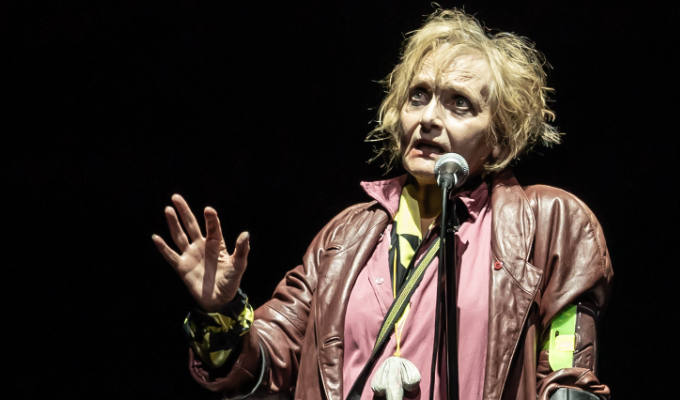 © Marc Brenner / RSC
© Marc Brenner / RSC Macbeth
Review of the new RSC production, with additional material by Stewart Lee
If you’re seeking a cynical definition of stand-up, ‘a tale told by an idiot, full of sound and fury, signifying nothing’ isn’t a bad place to start.
The line could also apply to parts of the new Royal Shakespeare Company production of Macbeth, with director Wils Wilson employing myriad inventive production flourishes with varying degrees of success.
Most notably, Stewart Lee was signed up to rewrite the Porter’s scene, a supposedly dark comic interlude following the offstage murder of Duncan, to which the centuries have not been kind. Lee’s interpretation as a playfully snarly stand-up routine recaptures the original intent as a boisterous lampoon of topical events, addressing the groundlings directly.
This scene is said to have been the origins of the ‘knock, knock’ joke, but the castle’s knocker is here replaced by an electronic buzzer, one of several seemingly anachronistic touches – a radio, a generator, puffer jackets – that place the production out of any specific time.
Performed with scoffing passion by Alison Peebles (above), the political targets of Lee’s satire are as expected – plus a nice jab at Russell Brand. But it’s meta-commentary that ignores the fourth wall that makes it, kicking what had been quite a moribund production into life.
Peebles mocks the GCSE pupils being given a leg-up by privileged parents who can afford the ticket price: ‘Dae ye no realise I’m deviating from the text?’ she taunts them – adding the ‘spoiler’ that Macbeth dies in the end. To poseurs pretentiously proud of their patronage of the arts, she sneers contemptuously: ‘I’ve had spam emails from Nigerian princes more sincere than you.’ And mocking the culture warriors of the right, she dismisses the RSC as ‘woke’ for actually casting women in women’s roles when that’s clearly men’s work. (Don’t tell them about the gender-blind casting here, including Thérèse Bradley as an effective Queen Duncan and Shyvonne Ahmmad and Amelia Isaac Jones as Malcolm and Donalbain),
Peebles’s spittle-flecked performance reinvigorates the production just when it needs it, and casts the next couple of scenes in a new light – with Lady Macbeth’s feigning ignorance of Duncan’s murder eliciting laughs for her insincerity.

By this point, Reuben Joseph had not yet distinguished himself as Macbeth, lacking the potency of a tormented warrior. Only later, after his passion for battle has been reinvigorated by the witches’ prophesy, he comes into his own – and he does appear truly haunted by Banquo’s ghost. He delivers his ‘tomorrow, and tomorrow, and tomorrow’ soliloquy into the mic – possibly as a callback to the Porter’s stand-up scene acknowledging the audience presence, though the director's motive for this is not clear.
Meanwhile Valene Kane, makes Lady Macbeth seems more like passive, airy follower of circumstances than the scheming power behind the throne.

Scenes involving the weird sisters (Amber Sylvia Edwards, Eilidh Loan and Dylan Read) are powerfully staged – we first see them emerging from the ground as if birthed by the Earth. Later, they fly over the scene of the bloodiest murders in a brutal moment that finds the power others lack. Meanwhile, an evocative soundscape deploying discordant brass and distant bagpipes speaks to mystical Scottish folklore, an otherworldly feeling emphasises by the witches’ strangely angular but fluid movements.
Choreography is less successful in the final battle between Macbeth and McDuff, eked out for too long and less convincing than a regional Wrestling smackdown, though the titular villain’s offstage demise has more impact. That's typical of a production high on theatrical gimmicks which variously illuminate or obscure the drama.
• Macbeth is booking at the Royal Shakespeare Theatre, Stratford-upon-Avon until October 14. Tickets here.
Review date: 31 Aug 2023
Reviewed by: Steve Bennett
Reviewed at:
Stratford-upon-Avon Royal Shakespeare Theatre








